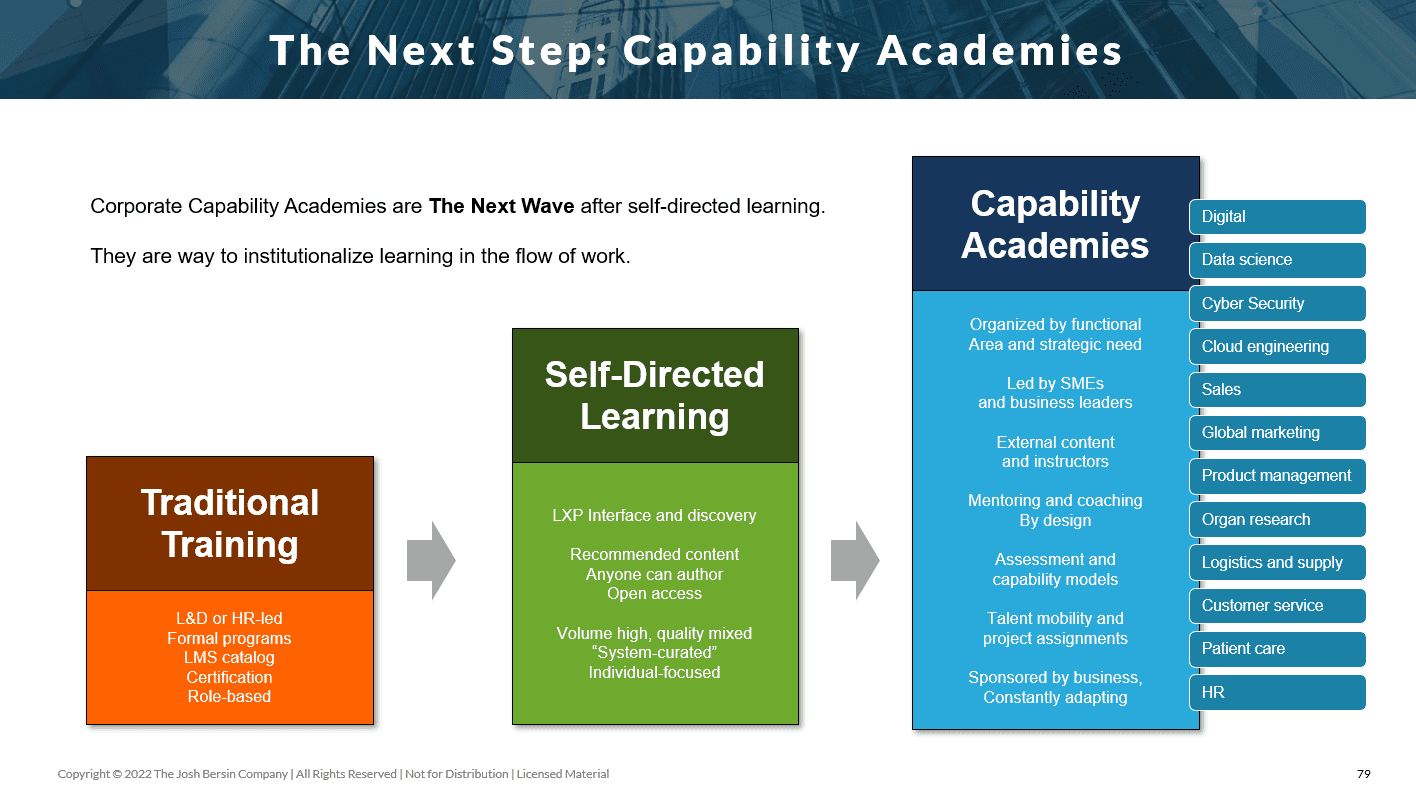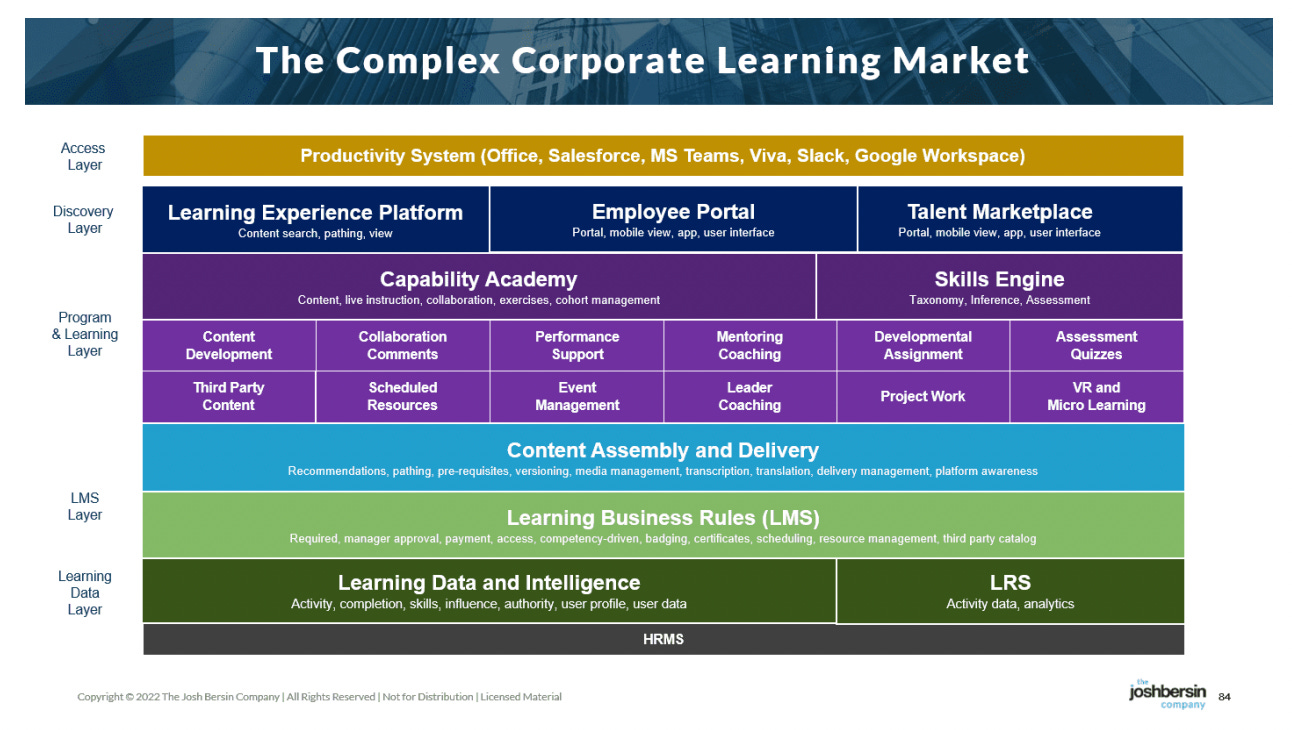This Week in EdTech 3/13/23
SVB, ChatGPT in Education, and New Developments in Corporate L&D
STORY: MASTERY-BASED LEARNING PLATFORMS
THE NEWEST DEVELOPMENTS IN CORPORATE L&D
This week we have an article written by guest contributor Josh Cardoz, an expert in digital learning experience design and strategy. Josh shares his experienced perspective on the changing landscape of technology in corporate L&D, and what we currently need in the L&D sector.
Since the arrival of eLearning in the early 2000s, the L&D community has been trying to pinpoint exactly what they need out of learning technology.
The Learning Management System (LMS) is a piece of technology that was created specifically for HR to track learning activities, and it has dominated corporate L&D for years. However, despite its popularity, LMS products have been plagued by issues, such as buggy technology, poor user experiences, and an excessive focus on logistics management.
As a result, organizations are increasingly turning to the Learning Experience Platform (LXP) for a more user-friendly experience and to access more than just completion tracking features that a traditional LMS offers.
However, even with attempts at improvement, various gaps still exist in this market; instead of tools phasing out or being replaced (it is highly unlikely the LMS will go away anytime soon), additional competing tools continue to be piled on top of the already complex landscape of learning management options within organizations.
Microlearning platforms, reinforcement apps, and a whole host of learning products have come and gone, and there is never a shortage of new solutions that attempt to solve corporate L&D challenges.Ask any corporate L&D buyer what their optimal tech stack would be, and you’ll never hear the same answer twice.
Even so, the already oversaturated LMS/LXP market remains ripe for the picking as organizations search for the perfect platform to meet their evolving needs and deliver better ROI. The latest addition to this array of tools is the Mastery-based Learning Platform, sometimes referred to as “Capability Academy”.

Corporate Education Josh Bersin introduces the new category in a recent article: the mastery-based learning platform is part of a new wave of platforms with a focus on robust capability development rather than hosting learning content and delivering consumption-based activities like videos and click-through courses. Companies in the category include Hone, Modal, CoRise, GrowthSpace, Nomadic, Sana Labs, Guidin, Degreed (which is also an LXP), and Teamraderie.

As the name suggests, the focus for these products is intended to be directly on “skill mastery”, not simply “time on task”, “compliance” or “usage.” These are, at least in theory, super-charged platforms with more emphasis on peer-driven learning, SMEs, cohorts, AI tools, real-world projects, collaborative learning and more.
Features like these come just in time, as HR departments must respond to the rise of the skills economy and what that means for L&D expectations.
The corporate world continues to pivot hard towards explicit skill building, and this may finally be the solution.
The hope is that this new wave of Mastery-Based platforms finally moves CLOs and learning leaders away from consumption-focused learning activities and towards impact measurement… but only time will tell if L&D departments are ready to jettison traditional measurements of corporate learning and embrace ‘mastery’.
What we do know is that experts in the field view this as the newest solution to a long-documented struggle between organizations and their learning tech, and it’s rapidly gaining attention.
But to be clear, even with this pivot towards skills development, a name like “mastery-based learning platform” feels like a major jump from what we know previous LMS and LXP products to offer.
Corporate L&D has historically been bad at tracking evidence of learning, often conflating the completion of a learning activity with learning itself. This has become so normalized that “evidence of completion” has become a primary metric for renewal of budgets tied to learning program maintenance and content subscriptions.
In other words, moving from the low bar of “completion” towards achieving and measuring mastery is a big jump, which begs many questions as learning experts begin to consider this new tool.
How can we even begin to track or measure mastery in workplace learning?
What does mastery mean in the context of workplace learning?
How can a tool guarantee mastery?
Are we really looking for mastery, or simply effective learning?
The move to mastery may be hubris; considering how difficult it is to actually learn anything in the workplace, perhaps we should first focus on meaningful and measurable learning experiences before we begin moving the goalposts to an ill-defined outcome such as ‘mastery’.
The emergence of this new category of learning tech does make one thing clear though: if L&D is to take skills seriously, it needs to radically change its model for talent development.
And perhaps if all goes well, this new wave of platforms will finally be able to aid in delivering the thing we’ve all been chasing in this space: impact.
TOP EDTECH HEADLINES
1) SVB
What does the SVB collapse mean for EdTech? Listen into our recent podcast episode as we discuss what this means for Education and EdTech specifically.
2) ChatGPT in Education
With rumors that Microsoft will launch ChatGPT 4 with AI videos next week, ChatGPT continues to take center stage in education conversations.
At the K-12 level, we see teacher’s beginning to leverage ChatGPT, with 40% of teachers saying they use ChatGPT weekly, and 10% saying they use it almost every day.
At the higher education level, professors are beginning to imagine how to navigate formal assessments in a world with ChatGPT, and creative ways to work with this new tool rather than against it. Some universities have reached the stage of proudly incorporating ChatGPT into the classroom.
And, several education companies have announced new products that explicitly leverage ChatGPT and AI:
aiEDU launches foundational AI literacy learning experiences
KlickData launches ChatGPT powered features in the KLMS Ecosystem
3) TikTok in Education
TikTok continues to slowly move towards the education sector, provoking mixed reactions. While TikTok is a competitive player in the edutainment market, there is also continued concern about long amounts of screen time, especially for children.
4) Teacher’s Leaving The Classroom and Transitioning into EdTech
Data shows that teacher shortage and attrition rates are likely to worsen before the 2022-2023 school year has ended. One factor at play is that the teacher pay penalty is at a record high. In response to this, Congress is considering implementing a teacher salary minimum, which is gaining both interest and criticism from the education community.
A notable number of teachers are attempting to transition into EdTech from traditional teaching careers due to these factors, and this career transition can prove harder than it may seem at first glance.
Two Special Announcements from our colleagues in the Edtech industry:
Ender is looking for parents and parenting groups in which to test its new collaborative, game-based learning product. Please share with any and all parents or Minecraft enthusiasts:
Ender is on a mission to help kids (aged 8-15) be employable by 18 through a portfolio of projects that demonstrate their skillset, starting with Minecraft competitions. They're onboarding their first 100 families (called "Pioneers") this month ahead of a public launch later this year. Edtech veteran Bhaumik Patel runs the program and would love to demo the product and get feedback form parents in exchange for an $25 Amazon gift card. Sign up here: cal.com/ender/parent-research.
WiKIT AS and Edtech Impact are partnering to offer Edtech companies a public profile that includes both scientific validation and customer feedback and user reviews.
EdTech companies will now be able to get a scientific validation of their evidence portfolio by WiKIT’s international network of researchers and strengthen their public profile on the global EdTech Impact platform.
FUNDING
United States
Asia
Europe
ACQUISITIONS
PARTNERSHIPS
LISTEN
Catch up on recent episodes of the Edtech Insiders podcast!
Creating Edtech Partnerships for Social Impact with Dana Bryson of Study.com
Edtech Startup Finalists pitching in the SxSW EDU Launch Competition
How Edtech Fuels the Homeschooling Revolution with John Edelson of Time4Learning
Unlocking Creativity through Artificial Intelligence with Varun Galati of Koalluh
Thanks for reading Edtech Insiders! Subscribe for free to receive weekly updates and support the podcast.







Alex and Sarah: Great idea to have a guest columnist.
Great post Josh. Really enjoyed reading it. Covers so many areas and provides very useful information.
The piece on corporate learning is very valuable. As intermediaries who support entrepreneurs in this space, it would be great to also learn more about the journeys entrepreneurs go through to get their first 10 clients, then the next 50 and the next 100, 200, 500, 1000+ clients. The decision points are different at each stage for the entrepreneur and also for the client they are pitching too.
I'm quite keen to start creating a framework of impact that gets embedded in journalistic reporting for education and workforce entrepreneurs. Right now its all about scaling up fast and raising money. But as well all know, its a lot more than that. Teams who do a good job, such as EdSurge, JFF etc. could be of support to others to define such metrics.
Akhil Kishore
GIA ADVISORS